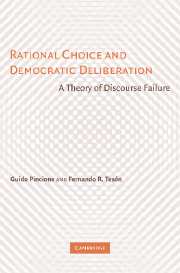Book contents
- Frontmatter
- Contents
- Preface
- Acknowledgments
- 1 Introduction
- 2 The Epistemic Argument for Deliberation
- 3 The Rational Choice Framework
- 4 The Resilience of Discourse Failure
- 5 Symbolism in Political Argument
- 6 Discourse Failure and Political Morality
- 7 Non-Epistemic Defenses of Deliberation
- 8 Deliberation, Consent, and Majority Rule
- 9 Overcoming Discourse Failure: Voluntary Communities
- Index
1 - Introduction
Published online by Cambridge University Press: 05 May 2010
- Frontmatter
- Contents
- Preface
- Acknowledgments
- 1 Introduction
- 2 The Epistemic Argument for Deliberation
- 3 The Rational Choice Framework
- 4 The Resilience of Discourse Failure
- 5 Symbolism in Political Argument
- 6 Discourse Failure and Political Morality
- 7 Non-Epistemic Defenses of Deliberation
- 8 Deliberation, Consent, and Majority Rule
- 9 Overcoming Discourse Failure: Voluntary Communities
- Index
Summary
The Allure of Deliberation
It is generally assumed that political deliberation is one of our most cherished values. Ideally, it precedes democratic decisions and enhances their legitimacy. Deliberative democracy, a form of political organization that fosters robust deliberation among citizens, is attractive because it appears as the only alternative to various undesirable things. First, deliberative democracy excludes elitist conceptions of politics. Deliberation stands in the way of the ambitions of self-appointed philosopher-kings. It vindicates self-government and the views of ordinary citizens. Because everyone's opinion counts, and because everyone participates in the formulation of public policies, deliberative democracy evokes the values of autonomy and civic equality. Second, deliberative democracy rejects political irrationalism. By placing faith in rational argument, theories of deliberative democracy conjure up the image of a political forum analogous to the scientific forum, where critical thinking improves our beliefs and the decisions based on them. Just as scientific deliberation increases our knowledge of the world and improves our technologies, so political deliberation furthers our moral and factual understanding of society and the selection of policies based on that understanding.
The undoubted appeal of deliberation and its role in democracy has led many writers to cast it as the cornerstone of a good polity. They have attempted to substitute a deliberative model of democracy for traditional, liberal models of constitutional democracy – that is, of rights-constrained majority rule. The relationship between theories of deliberative democracy and theories of liberal democracy may assume various forms.
- Type
- Chapter
- Information
- Rational Choice and Democratic DeliberationA Theory of Discourse Failure, pp. 1 - 7Publisher: Cambridge University PressPrint publication year: 2006



